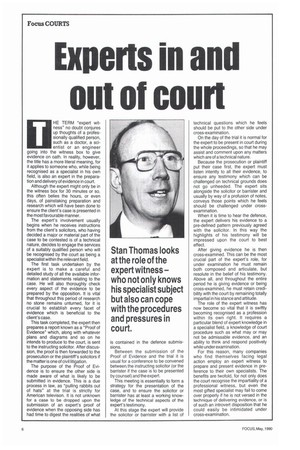Experts i Hand out of co
Page 8

If you've noticed an error in this article please click here to report it so we can fix it.
rt
HE TERM "expert witness" no doubt conjures up thoughts of a professionally qualified person, such as a doctor, a scientist or an engineer going into the witness box to give evidence on oath. In reality, however, the title has a more literal meaning, for it applies to someone who, while being recognised as a specialist in his own field, is also an expert in the preparation and delivery of evidence in court.
Although the expert might only be in the witness box for 30 minutes or so. this often belies the hours, or even days, of painstaking preparation and research which will have been done to ensure the client's case is presented in the most favourable manner.
The expert's involvement usually begins when he receives instructions from the client's solicitors, who having decided a major or material part of the case to be contested is of a technical nature, decides to engage the services of a suitably qualified person who will be recognised by the court as being a specialist within the relevant field.
The first task undertaken by the expert is to make a careful and detailed study of all the available information and statements relating to the case. He will also thoroughly check every aspect of the evidence to be prepared by the opposition. It is vital that throughout this period of research no stone remains unturned, for it is crucial to establish every facet of evidence which is beneficial to the client's case.
This task completed, the expert then prepares a report known as a "Proof of Evidence" which, along with whatever plans and diagrams and so on he intends to produce to the court, is sent to the instructing solicitor. After discussion, the proof is then forwarded to the prosecution or the plaintiff's solicitors if the matter is one of civil litigation.
The purpose of the Proof of Evidence is to ensure the other side is made aware of what is likely to be submitted in evidence. This is a due process in law, as "pulling rabbits out of hats" at the trial is strictly for American televison. It is not unknown for a case to be dropped upon the submission of an expert's proof of evidence when the opposing side has had time to digest the realities of what is contained in the defence submissions.
Between the submission of the Proof of Evidence and the trial it is usual for a conference to be convened between the instructing solicitor (or the barrister if the case is to be presented by counsel) and the expert.
This meeting is essentially to form a strategy for the presentation of the case, and to ensure the solicitor or barrister has at least a working knowledge of the technical aspects of the expert's testimony.
At this stage the expert will provide the solicitor or barrister with a list of technical questions which he feels should be put to the other side under cross-examination.
On the day of the trial it is normal for the expert to be present in court during the whole proceedings, so that he may assist and comment upon any matters which are of a technical nature.
Because the prosecution or plaintiff put their case first, the expert must listen intently to all their evidence, to ensure any testimony which can be challenged on technical grounds does not go unheeded. The expert sits alongside the solicitor or barrister and usually by way of a profusion of notes, conveys those points which he feels should be challenged under crossexamination.
When it is time to hear the defence, the expert delivers his evidence to a pre-defined pattern previously agreed with the solicitor. In this way the highlights of his testimony will be impressed upon the court to best effect.
After giving evidence he is then cross-examined. This can be the most crucial part of the expert's role, for under examination he must remain both composed and articulate, but resolute in the belief of his testimony. Above all, and throughout the entire period he is giving evidence or being cross-examined, he must retain credibility with the court by remaining totally impartial in his stance and altitude.
The role of the expert witness has now become so vital that it is swiftly becoming recognised as a profession within its own right. It requires a particular blend of expert knowledge in a specialist field, a knowledge of court procedure such as what may or may not be admissable evidence, and an ability to think and respond positively while under examination.
For this reason, many companies who find themselves facing legal action employ an expert witness to prepare and present evidence in preference to their own specialists. The benefits are twofold, for not only does the court recognise the impartiality of a professional witness, but even the most gifted specialist may fail to come over properly if he is not versed in the technique of delivering evidence, or is of such an introvert disposition that he could easily be intimidated under cross-examination.
























































































































